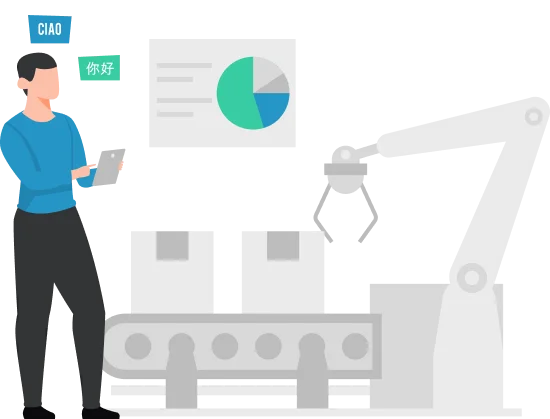Manufacturing Translation Services
Get your quote

A Trusted Partner For Manufacturing Translation Services
CCJK is a leader in professional manufacturing translation services. From product specifications, and labeling to instruction manuals and brochures, we can meet all your translation requirements. Our bilingual experts are seasoned professionals who have helped hundreds of industrial manufacturing companies transcend borders, languages, and cultures. If you need to communicate with your global customers, suppliers, or other stakeholders in multiple languages, you can count on us. We keep costs reasonable and deliver exceptional linguistic fluency and accuracy of translations, so you can thrive globally with confidence.
Our clients
World’s top organizations rely on CCJK
Go Global With Manufacturing Translations
We help expand globally by offering manufacturing and industrial translation services for all kinds of documents.
- Raw material specifications
- Intellectual property ownership
- User/operator instructions
- Quality agreements
- Standard operating procedures
- Material safety data sheets
- Commercial terms
- Mutual indemnification
- Marketing collateral


Our Qualified Manufacturing Translators
Our manufacturing translators are native speakers of your target language. They possess an in-depth knowledge of the unique languages and diverse regional dialects present in their country. Plus, they have domain expertise in one or two industrial fields, such as chemical, medical, automotive, and more. Based on these skills and expertise, our linguists are adept at catching any linguistic or business details in your documents with speed and accuracy. The result: you get high-quality, fitting manufacturing translations on time and within the budget.
Translations For Every Manufacturing Sector
Our linguists are ready to support your translation, voice-over, subtitling, multimedia DTP, and other localization plans, regardless of what sector you operate in.
- Chemical
- Oil & Gas
- Automobile Engineering
- Medical Device
- Electronics
- eCommerce
- Technology
- Fashion & Textile

Manufacturing translation made easy. Why wait?

Getting The Manufacturing Terminology Right
Having language and cultural awareness isn’t enough to perform a professional translation service. It takes more than just that. A translator who is not familiar with the manufacturing industry can deliver mere literal translations. You need experts on your side who have the right knowledge and can get across the complex terminologies, concepts, and jargon in the language and industry. This is where we at CCJK thrive. Our highly-trained professional translators understand what language the industrial companies speak. This enables us to deliver translation services for manufacturing that are meticulously accurate, easy to understand, and make your target audience connect with you.
Explore Tailored Manufacturing Translation Services
Browse our specialized translation services for all types of manufacturing documents, including user manuals and safety guides. Get precise translations that ensure global accessibility and compliance.
We’re A Leading Name In Manufacturing Translation
CCJK brings more than 20 years of experience providing native-quality manufacturing translation services at the best prices.

30,000+ native translators
We’re a diverse tribe of 30,000 professional translators who only translate in their first language and specialty area, ensuring well-worded, localized translations every time.

Quick turnaround
We boast some of the fastest turnaround times in the translation industry. However, this does not compromise our commitment to quality.

ISO certified
Being an ISO-compliant Manufacturing translation company, we promise translation services of the highest quality humanly possible.

230+ languages
We present your business to the world in as many as 230 languages and 800+ language combinations. From English to Japanese, Arabic to Cajun – we’ve got the entire globe covered.